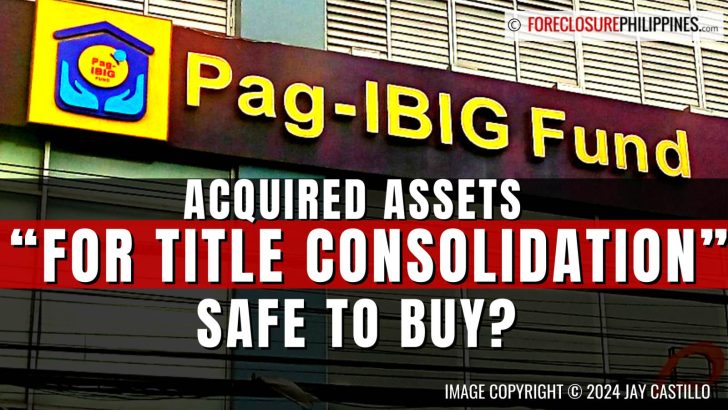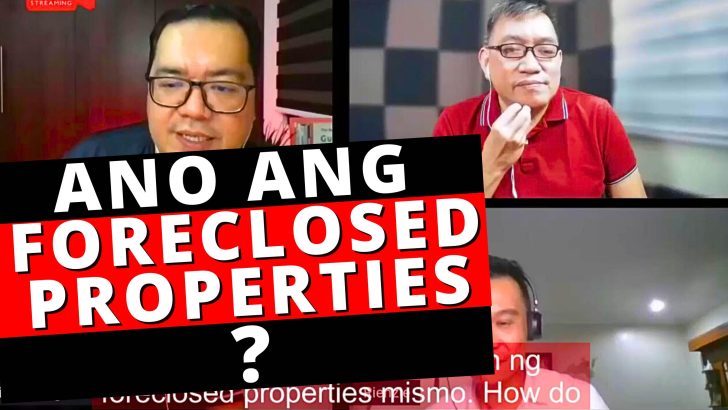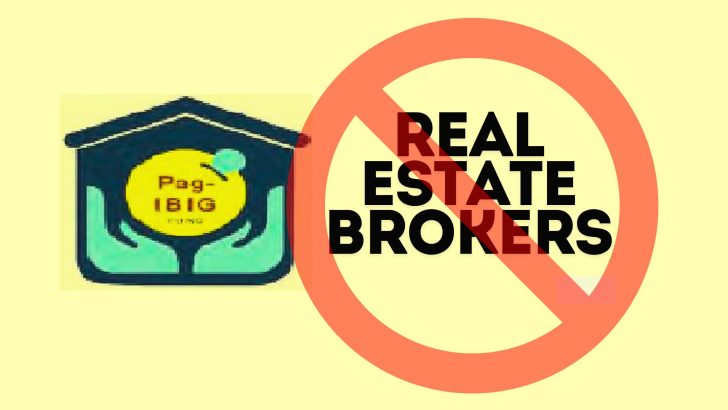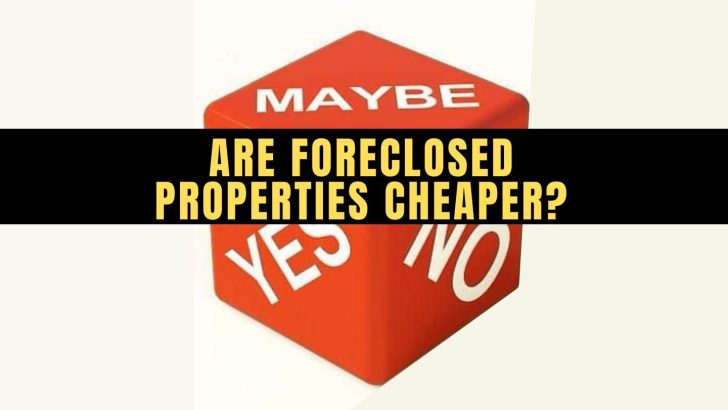A lot of Pag-IBIG acquired assets / foreclosed properties have a status of “For Title Consolidation”. What does this mean? Are they safe to buy? Lets find out. I’ll also share 2 real life examples. …

Table of Contents
For Title Consolidation Meaning
So what is for title consolidation exactly? To explain, let me first share the definition of the term “Consolidation of Title”.
According to Pag-IBIG Fund Circular 424: “Modified Guidelines on Extrajudicial Foreclosure of REM (Effective on 18 May 2019)”:
“Consolidation of Title – Change in the name reflected in the Transfer/Condominium Certificate of Title (TCT/CCT) from that of the borrower mortgagor to that of the Fund.”
{Source}
In other words, it means the title of the property is still under the name of the previous owner (the “borrower mortgagor”) as stated in Pag-IBIG Fund Circular 424, and the title still needs to get transferred to Pag-IBIG Fund or HDMF (also referred to as “The Fund”). Title consolidation is either ongoing or it has not yet started.
And since these Pag-IBIG acquired assets/foreclosed properties are for sale on an “as is where is” basis, you expressly agree to buy them as such with no warranties/recourse. (Learn more here: What does “As Is, Where Is” mean?)
By the way, I want to make it clear, when I refer to Pag-IBIG foreclosed properties/acquired assets, it means these properties are no longer under redemption, which is why Pag-IBIG can already proceed with the title consolidation.
Properties that are still within the redemption period are not included in Pag-IBIG’s listings, which is good because they should be avoid as explained here: What are foreclosed properties/acquired assets (and which to avoid)?
Who will shoulder the cost for title consolidation?
Thankfully, the title transfer and related expenses (real estate taxes and fees) should be handled by Pag-IBIG. After all, the transfer will be from the previous owner to Pag-IBIG.
Take note however that this excludes the transfer from Pag-IBIG to the buyer (which would be you in this case).
When you buy a foreclosed property and you are fully paid (or if you get a mortgage loan), you can proceed with transfer of ownership under your name, and the actual legwork and any expenses will be shouldered by the buyer.
How long does title consolidation take?
It depends on the completeness of the required documents and how fast Pag-IBIG will actually do the transfer.
Worst case, according to them, it can take up to 5 years to complete if the property has issues (ex. property is under abatement – has something to do with asking the BIR for an exemption/reduction of tax payments related to the property, which is too complicated to discuss here).
As an example, let us refer to the screenshot below of a negotiated sale listing from Pag-IBIG Cebu, and see the bottom part which I encircled in green:

It says:
“NOTE: ACCOUNTS UNDER ABATEMENT MAY TAKE UP SEVERAL YEARS (MORE OR LESS 5 YEARS) FOR TCT TO BE CONSOLIDATED IN THE NAME OF THE FUND”
Source
Title consolidation can also take a long time if there are missing documents needed for the transfer of ownership, or if there are taxes left unpaid. Remember, another requirement for transfer of ownership is a Certificate Authorizing Registration or CAR from the BIR and they will not issue this unless all taxes related to the transfer are paid.
I remember I was part of group who purchased a property from a bank and it turned out that taxes were not paid for the transfer from the developer to the previous owner (the CAR was bogus!), and we had to escalate the issue so that the bank will shoulder this. They finally agreed to pay the taxes after several months and they finished the consolidation… whew!
One last thing, since Pag-IBIG handles consolidation of titles through “batch processing” where they compile a number of titles before they proceed with the legwork (maybe to save on expenses for going to/from the Registry of Deeds), this can make the whole process longer.
How I wish they will allow the buyers to help with the consolidation like what BFS does (they allow buyers to handle the consolidation from the previous owner to BFS).
Keep in mind that title transfers can actually get done quickly if all required documents are ready and if someone focuses on doing the legwork. The fastest I can remember for a foreclosed property was about 3 months when I outsourced the title transfer (from the bank’s name to me and my wife). 🙂
For Title Consolidation Meaning in Tagalog
In tagalog:
“Yung titulo ng bahay/lupa/condo ay nakapangalan pa sa dating may-ari (yung umutang sa Pag-IBIG). Kailangan pang ilipat sa pangalan ng Pag-IBIG/HDMF ang titulo at ang maglalakad nito ay ang Pag-IBIG.
Sa paglipat ng titulo galing Pag-IBIG papunta sa buyer, ang gagastos ay ang Pag-IBIG/HDMF.
Pwede tumagal ang paglipat ng titulo mula sa dating may-ari papunta sa Pag-IBIG/HDMF, lalu na kung may kulang na dokumento or kailangan matapos yung abatement, etc.”
I hope the summary above is enough for those who are looking for the correct tagalog translation of what I discussed above. Let me know if there’s anything else you want me to translate into tagalog.
Is it safe to buy? What are the implications?
In order to determine if it is safe to buy a property that is not yet consolidated, here are my top 2 considerations to keep in mind:
1. Is the property occupied?
In my opinion, the first thing you need to check as part of due diligence is if the acquired asset/property has illegal occupants.
For the most recent listings of Pag-IBIG acquired assets/foreclosed properties under their NCR office, they have the following statuses:
- Occupied – Occupant Undisclosed – For Title Consolidation
- Occupied – Occupant Undisclosed
- Unoccupied – For Title Consolidation
- Unoccupied
I highly discourage buying any of the properties that include an “Occupied” status.
If the property has illegal occupants, the buyer will be responsible for the ejection case and all expenses involved. This can take years and many sleepless nights… which in my opinion is not worth it.
Watch this video to see what can happen if you buy an occupied property from Pag-IBIG: Why we don’t recommend buying foreclosed properties that are occupied (even if they are cheap).
By the way, just because a property is listed as “Unoccupied”, it does not mean it really is unoccupied. I have received info from a lot of readers that unoccupied properties turn out to have illegal occupants.
I suppose this happens when there are no caretakers assigned to a property that has no occupants. Later on, nothing will prevent informal settlers (or even the previous owner) from breaking-in to occupy the property.
This means you really have to inspect a property in-person to confirm there are no illegal occupants, before you proceed and finalize the purchase.
2. How will you use the foreclosed property?
A. You plan to flip the property
If you are planning to flip (buy /renovate / sell) the property fast, then it might be better to just look for other properties.
In order to flip a property, you should be able to sell quickly and buyers will obviously want the property ownership to get transferred to their name. However, you cannot do this if the title is not yet consolidated.
If your buyer plans to finance the purchase with a housing loan, one requirement is the title should be under the seller’s name. This means you can only fulfill this requirement after you transfer the ownership under your name. In effect, after the title has been consolidated (it is under the name of Pag-IBIG), then you can transfer it under your name, provided you are already fully paid.
As mentioned above, the consolidation process can take up to 5 years to complete. Do you think you can find a buyer who is willing to wait for up to 5 years for the transfer of ownership to their name? I don’t think so.
B. You will keep the property
If you intend to keep the property to use it yourself or as a rental property, then this just might work.
Since you will be keeping the property, then the long time for title consolidation doesn’t really matter. You don’t have to transfer the title yet because you can still move-in (as long as there are no illegal occupants) and use the property (or have it leased out) even if the title is not yet under your name.
As long as there is no need for the property ownership to get transferred quickly, then it should be okay.
I bought 2 foreclosed properties that were for title consolidation and this happened
I remember when I bought a foreclosed property that was not yet consolidated that I wanted to flip.
It turns out the title transfer was actually ongoing (the bank was just waiting for the registry of deeds to release the new title). A few weeks after I won at the bidding for this property, the bank informed me the consolidated title was already released. I was able to flip this property successfully in just 55 days. 🙂
I then encountered a similar foreclosed property from the same bank, and it also had an unconsolidated title.
The bank assured me that consolidation would be fast just like my previous purchase, so I went ahead and participated in the auction, and I ended up as the winning bidder.
This time, I wasn’t able to quickly flip this property because it actually took almost 3 years to consolidate!
It took so long because of a missing document required for the transfer from the developer to the former owner. The bank had to find the person-in-charge with the developer and get the document, which took a very long time (around 2 years). After that they had to transfer the title to the former owner and then to the bank.
I’m just glad I was still able to flip that property with an acceptable profit margin. 🙂
Keep in mind that even if my examples above was for bank foreclosed properties, the same situation applies to Pag-IBIG properties that are not yet consolidated.
Anyway, this was a huge eye-opener for me! Thankfully, I learned my lesson and never bought unconsolidated properties after that.
If you are a training alumni and want more details, you will find them all inside the due diligence module.
Conclusion
While majority of Pag-IBIG acquired assets and foreclosed properties for sale are still “for title consolidation”, it doesn’t mean you cannot buy any of them.
As long as they do not have illegal occupants and you plan on holding on to the property for several years, then it can still make sense to buy.
By the way, you will also encounter foreclosed properties from banks and other government financial institutions with a status of for consolidation of title meaning what I shared above also applies to foreclosed properties/acquired assets from banks and other government financial institutions, not just those from Pag-IBIG.
Got questions/concerns about foreclosed properties that are not yet consolidated? Let me know by leaving a comment below.
Good luck and happy investing!






![Why invest in foreclosed properties in the Philippines? + Top things to consider [Video] 5 Why invest in foreclosed properties in the Philippines? + Top things to consider [Video]](https://www.foreclosurephilippines.com/wp-content/uploads/2023/03/video-how-to-invest-in-foreclosed-properties-in-the-philippines-v3-728x410.jpg)


good day sir I want to have a for closure house in dela costa homes tungko mangga San Jose del monte or near area if I’m qualified to file on pag ibig housing loan pls message me sir thanks and god bless
Hi! Is there any expenses or matters that we would shoulder as a buyer for the consolidation title? or is it purely at the expense of the fund?
it’s an unoccupied lot btw
Hi Krylle!
The cost for title consolidation (transfer of title from previous owner to Pag-IBIG) will be shouldered by Pag-IBIG Fund, buyers will not shoulder anything for this. 🙂
Happy to see your target property is unoccupied, good luck and I hope your transaction goes smoothly!
Thank you for answering! I have another question though, would it be 100% guaranteed that the title would be transferred in my name even though it would take years (as per your example)? and if ever I won the bid, will the fund approve a loan even though the title is not in their name yet? Thank you so much!
You are welcome Krylle, happy to help! As to getting 100% assurance from Pag-IBIG that the title will be transferred to your name, that would depend on the success of the title consolidation (the transfer from the former owner to pag-IBIG).
Keep in mind that for the title to get transferred to your name (where you will shoulder the cost) you must already be fully paid (and of course, the title must already be consolidated to Pag-IBIG).
For Pag-IBIG acquired assets, instead of the real estate mortgage loan, the contract they will use for long term installment payments is a deed of conditional sale (at the moment this is what they have in place), which does not need the title to get transferred to you yet (once fully paid, the title will be released to the you as the buyer and the buyer will do the transfer from Pag-IBIG to the buyer).
Is is wise that you will opt to pay cash for a bid with a title that is yet for consolidation?
Hi Ann, only if you are okay with holding on to a property for a long time (as Pag-IBIG said, around 5 years) and all your capital is tied up to that property. You can also get a discount for cash payment (unless 1st bidding).
Thanks for sharing. Nag accredit ba Pagibig ng brokers/salesperson?
Hi RT, thanks for the question. Because of it, I wrote a dedicated article that explains why Pag-IBIG does not allow brokers/salespersons to sell their foreclosed properties:
No, You Cannot Sell Pag-IBIG Acquired Assets as a Real Estate Broker/Salesperson (This is why)